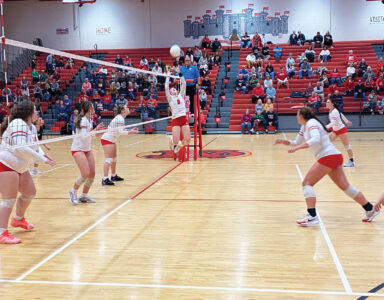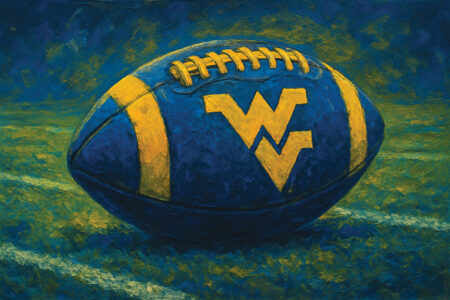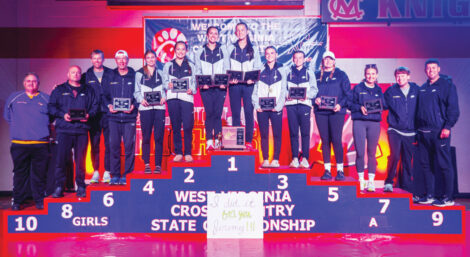Messerly prepared for whatever is thrown at WVU

Then-WVU associate athletic director for facilities and operations April Messerly talked about some of the stadium improvements at Milan Puskar Stadium in 2016. (Photo Provided by BlueGoldNews.com)
MORGANTOWN — It’s raining.
You might have noticed that. Rained yesterday, too.
It’s on all the newscasts. In Fairmont and the surrounding area it’s been a lethal storm, a disaster with accompanying floods and loss of life.
So weather is on all of our minds and that makes it timely to discuss weather’s affect on sports at West Virginia University, where they play games always with one eye on the sky.
See, they famously say “everyone talks about the weather but nobody does anything about it.”
Not true.
WVU does what it can to prepare for it and handle it when a storm blows into town to mess with a local game.
Going back to the Sept. 4, 2011, battle with Marshall when play was delayed more than three hours before the game ended with 14:36 left in the fourth quarter with WVU given a 34-13 victory, it’s become a familiar part of football.
April Messerly, today Executive Senior Associate Athletics Director for Capital Projects, Facilities and Event Management, was in her early days as facilities manager for WVU then and was facing such a problem for the first time.
“OK, that’s a bucket list item I can check off and never worry about again,” she remembers saying at the time.
If only.
That is one of at least four times they have had to stop football games and evacuate Milan Puskar Stadium’s seating bowl for long periods of time. Messerly knows one thing from having to handle those experiences.
“No stadium is designed to hold its capacity in its concourses,” she said.
Putting 60,000 people onto the concourses is like putting 14,000 more people than the entire population of the state capitol of Charleston into that small space.
“So, when these things happen, people need to realize that,” she said.
It isn’t a matter of comfort. It’s a matter of safety, and you have a large group of fans who came out for football, who spent hours tailgating, and then being asked to wait around away from where any lightning can strike them or strong wind can blow them out of the stands.
The preparation program and what is asked of fans constantly is changing as they learn from each experience.
“We hear from our fans, we hear from our coaches, we hear from our emergency personnel. We’re always trying to get better, to figure it out and do something differently,” she said.
For example, on the courses they are playing the radio broadcast but when there were updates in the situation they were being delivered by public address announcer Bill Nevin within the stadium bowl, but most could not hear him. So now, they cut the broadcast off while Neven gives his update.
“We have folks who say they were at the game with their mom and dad and they are in their 80s and didn’t have time to get out,” Messerly went on. “That’s when we started putting instructions on the video board in advance, so they could get an early start before the storm hit.
With it all, though, the concourse isn’t built to hold 65,000 people.
“We ask them to shelter in place in the bathrooms, which creates a little more room in the concourses, but the bathroom doesn’t have air conditioning,” she said. “What do you do? We try to keep emergency paths open in case, God forbid, someone has a seizure or something. We have to get first responders to folks.”
—
Following the Marshall game in 2011 we decided we were going to try and have a meteorologist on site.
That came after the Marshall games saw players brought out to warm up, then another lightning strike would hit and the players would be asked back under cover.
So, they have a meteorologist from the national weather service in Pittsburgh on hand to make sure the storm and lightning has cleared the area.
“At the same time, we are simultaneously having conversations with TV, with the coaches of both teams,” she said. “Both teams have to agree on the length of a warmup time once you come out. That is talked about.”
The NCAA rule sets a perimeter of eight miles from the stadium for lightning strikes and it must be clear of any strikes for 30 minutes before play begins. Often — and the WVU baseball team saw it in the postseason — you may not have rain but there may be lightning in the area and the game is put on hold.
The baseball team had a three-hour delay due to this rule.
“It can be a cat and mouse game there,” Messerly said. “That’s the beauty of having a meteorologist sitting in the command center with us, being able to say ‘All stuff is moving north, we’re not going to have an issue. There’ll be a few more things in an hour and a half but we’ll cross that bridge when we get there.'”
The priority, Messerly assures, is the safety of the fans and athletes.
“But, we try to balance that with getting the game in and giving everyone the best game experience we can,” she said, admitting that much of it is out of their control. “All we can do is react to it, have a good plan and there’s always something to be learned.”
They do emphasize getting the game on safely.
“We don’t want people to leave. We want people to cheer on the Mountaineers when we come back,” she said.
—
On game week, every Thursday morning the university gets a specific forecast for the area from the National Weather Service. It’s updated on Friday morning and on Saturday morning.
Messerly passes it along to the teams, the game officials, the TV people, who have their own meteorologist. They also communicate the information to the Big 12.
There is a pregame meeting on Saturday, called “The 120-minute Meeting”, involving everyone and they go over any emergency evacuation situations, including weather.
That sets the stage.
“Once that ball is kicked, technically it is in the hands of the officiating crew,” Messerly said, “but they don’t have a lightning detection system so they rely on game management.”
If there’s a lightning strike in the area, they inform the officials it has occurred and that the game should be suspended until the lightning has cleared out.
“I wish it was textbook for all these situations and games, but it’s just not,” Messerly said.
—
Messerly is beginning her 26th football season at WVU after getting her degree in sports management at the University of Virginia.
“You had to go through the university’s intern program to get an internship there,” Messerly said. “You had to interview and then they placed you. I don’t know if they did a secret personality test on me, but they placed me in facilities and operations.
“I remember, I was so bummed out about that. I told them I don’t know how to fix a leaky toilet or build a building. But they put me in facilities and operations and I loved it. I realized, ‘April, you don’t have to know how to do those things. You just need to have a good staff that could do those things.
“I loved it and it really clicked. I told my supervisor I want to do this. How do you go about it?”
He told her there were two ways, either to know someone in the industry, which she didn’t, or to go to grad school.
“I went to grad school here and I’m so grateful,” she said. “It’s such a strong program, they had a facilities and operations position open and hired me. I ended up doing my graduate assistanceship, and it ended and I wound up looking for jobs and they said, ‘What if we create a position for you to stay here? Would you consider that?'”
She’s still here.
“I came in 2000 and if you’d told me 25 years later I’m still here, married, with a graduating senior and daughter who is turning 16 years old today, I’d have said ‘No way,'” she said.




